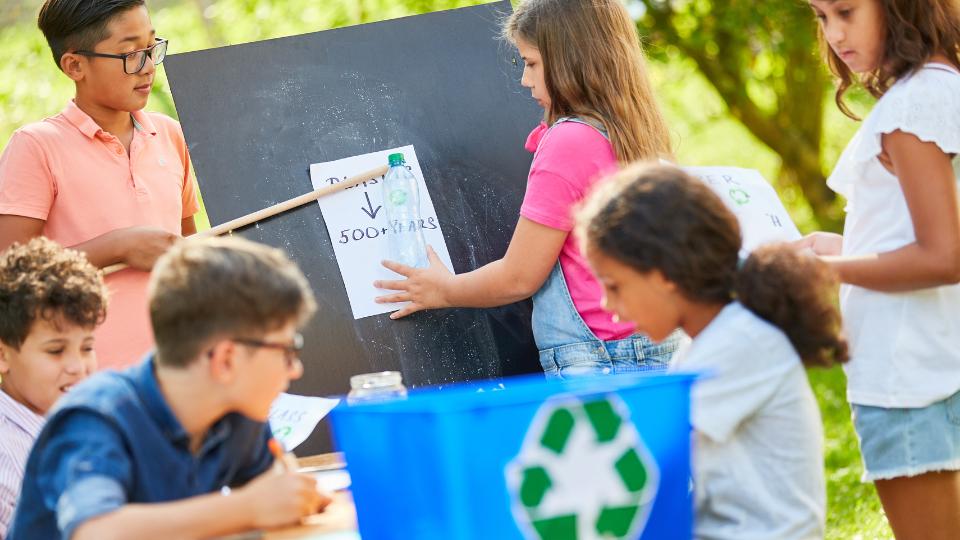
Managing school waste effectively is crucial for promoting sustainability and reducing the environmental impact of educational institutions.
This guide provides UK head teachers and educational decision makers with all the information they’ll need on school waste, including how to manage it, reduce it, and understand the extent of different types of waste produced in schools.
Table of Contents
- Understanding School Waste
- How to Manage School Waste
- How to Reduce Waste in Schools
- Food Waste in Schools
- Paper Waste in Schools
- Plastic Waste in Schools
- Conclusion
Understanding School Waste
School waste encompasses various types of waste generated within educational institutions, including paper, plastic, food, and other materials. Effective management and reduction of school waste are essential for fostering an eco-friendly environment.
How to Manage School Waste
Managing school waste involves several key steps:
Conduct a Waste Audit
A waste audit helps identify the types and amounts of waste produced. This step is crucial for understanding where to focus waste reduction efforts.
Implement Recycling Programs
Recycling programs should be established for paper, plastic, and other recyclable materials. Ensure your business bins and internal bins are clearly labelled and accessible.
Educate Students and Staff
Awareness campaigns and educational programs about the importance of waste reduction can encourage responsible waste disposal habits among students and staff.
Partner with Waste Management Services
Use an eco-friendly waste management service to ensure proper disposal and recycling of school waste.
How to Reduce Waste in Schools
Reducing waste in schools requires a proactive approach:
Minimise Paper Use
- Go Digital: Encourage the use of digital platforms for assignments and communications.
- Double-Sided Printing: Promote printing on both sides of the paper.
Reduce Single-Use Plastic Waste
- Reusable Containers: Encourage the use of reusable water bottles and lunch containers.
- Ban Single-Use Plastics: Implement policies to eliminate single-use plastics from school cafeterias and events.

Combat Food Waste
- Portion Control: Serve appropriate portion sizes in the cafeteria to reduce leftover food.
- Food Sharing Programs: Set up programs to share surplus food with those in need.
Food Waste in Schools
Facts About Food Waste in Schools
- The UK wastes around 9.5 million tonnes of food each year, with schools contributing significantly to this figure.
- The education sector in the UK wastes around £250,000 of food waste per year.
How Much Food Waste Do Schools Produce?
Primary schools in England generate 55,408 tonnes of food waste annually, while secondary schools contribute 24,974 tonnes. Altogether, this results in a total of 80,382 tonnes of food waste produced by schools across England each year.
Shockingly, it’s estimated that almost 77% of this food waste was avoidable.
When looking at our own customer data at Waste Managed, we found that businesses we collected waste for in the education sector produced the 4th highest amount of food waste with only the hospitality, care, and sectors having more.

Strategies to Reduce Food Waste
- Menu Planning: Design menus based on students’ preferences to reduce uneaten food.
- Composting: Establish composting programs for food scraps to create valuable compost for school gardens.
Paper Waste in Schools
How Much Paper Do Schools Waste a Year?
UK schools are estimated to use over 1 million sheets of paper per year, with a significant portion going to waste. This contributes to deforestation and increased carbon footprint.
Reducing Paper Waste
- Digital Learning: Use e-books, online assignments, and digital communication to cut down on paper use.
- Paper Recycling: Ensure that all used paper is recycled appropriately.
Plastic Waste in Schools
How Much Plastic Waste Do Schools Produce?
Schools in the UK generate a substantial amount of plastic waste, primarily from single-use items such as water bottles, food packaging, and stationery.
Reducing Plastic Waste
- Sustainable Practices: Encourage the use of biodegradable or reusable materials.
- Educational Campaigns: Educate students about the environmental impact of plastic waste and promote sustainable alternatives.

Conclusion
Effective management and reduction of school waste are vital for promoting sustainability in educational institutions. By conducting waste audits, implementing recycling programs, and educating the school community, UK schools can significantly reduce their environmental impact.
Adopting digital solutions, minimising single-use plastics, and reducing food waste are essential steps toward a greener future.
Encouraging responsible waste management practices within schools not only benefits the environment but also instils valuable lessons in students about the importance of sustainability and conservation.







